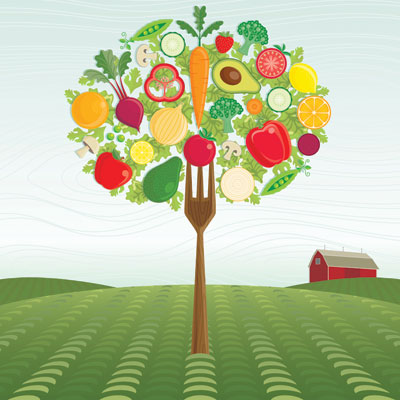Purchasing food is a commonality all Americans share. Where the food comes from, however, and how it’s grown, is another matter entirely. Recently, there has been a large movement towards sustainable agriculture. Sustainable agriculture is food produced by local farmers that is much more ecologically friendly than food grown on large farms. In addition, sustainable agriculture is commonly organic, meaning it’s not genetically modified, and is grown without pesticides. Agriculture produced by large farming corporations often neglect the consequences of overusing the finite amount of natural resources necessary for farming, and ignore the harmful effects of pesticides.
Sustainable agriculture is a way of providing food for the present, without compromising our ability to provide food in the future. In comparison, on standard farms, fiscal farming techniques commonly result in extracting all the nutrients from soil, washing away topsoil or drying up water sources. These problems eventually lead to land that’s unfit for farming.
 Despite the advantages of buying sustainable produce from local farms, there is a large portion of people who cannot afford the high prices of sustainable food. Sustainable agriculture is more expensive for many reasons. For example, because of the minimal use of pesticides, more workers are necessary to eliminate weeds and insects, and to pay workers decently, instead of minimum wage, is fairly costly. Also, the price of owning land and raising organically fed livestock is significant. In addition, it is often harder for local, sustainable farmers to reach consumers.
Despite the advantages of buying sustainable produce from local farms, there is a large portion of people who cannot afford the high prices of sustainable food. Sustainable agriculture is more expensive for many reasons. For example, because of the minimal use of pesticides, more workers are necessary to eliminate weeds and insects, and to pay workers decently, instead of minimum wage, is fairly costly. Also, the price of owning land and raising organically fed livestock is significant. In addition, it is often harder for local, sustainable farmers to reach consumers.
The discrepancies in wealth in our country result in similar discrepancies in the popularity of sustainable agriculture. Lower income families often don’t want to spend the extra dollars, or can’t spend the extra dollars, to buy sustainable food. “I think there’s a lot of innovative solutions in play addressing that - from community gardens, school gardens, CSA’s [these are people who buy a share of a farm, and are then sent weekly deliveries of fresh produce], institutions that have their own farms… subsidized food in schools,” said Sibella Kraus, spokesperson and supporter of the sustainable food movement.
There are other ways for people with lower incomes to afford sustainable agriculture in addition to the aforementioned programs, such as eating in season and growing your own food. Also, if farmers received more government support such as horticulture grants or lower taxes they wouldn’t have to rely solely on the sale prices of their produce for their income, which would make their prices more affordable.
As Americans we have the responsibility of being informed and conscientious consumers. It’s critical to support sustainable farming to ascertain the natural resources necessary for farming don’t run out in the future. Investing in sustainable food now will pay off in the long run, regardless of the high price. The food that is kept cheap by artificial means is the food that is going to turn out to be costly - for the health of individuals and the health of the environment.
No comments:
Post a Comment